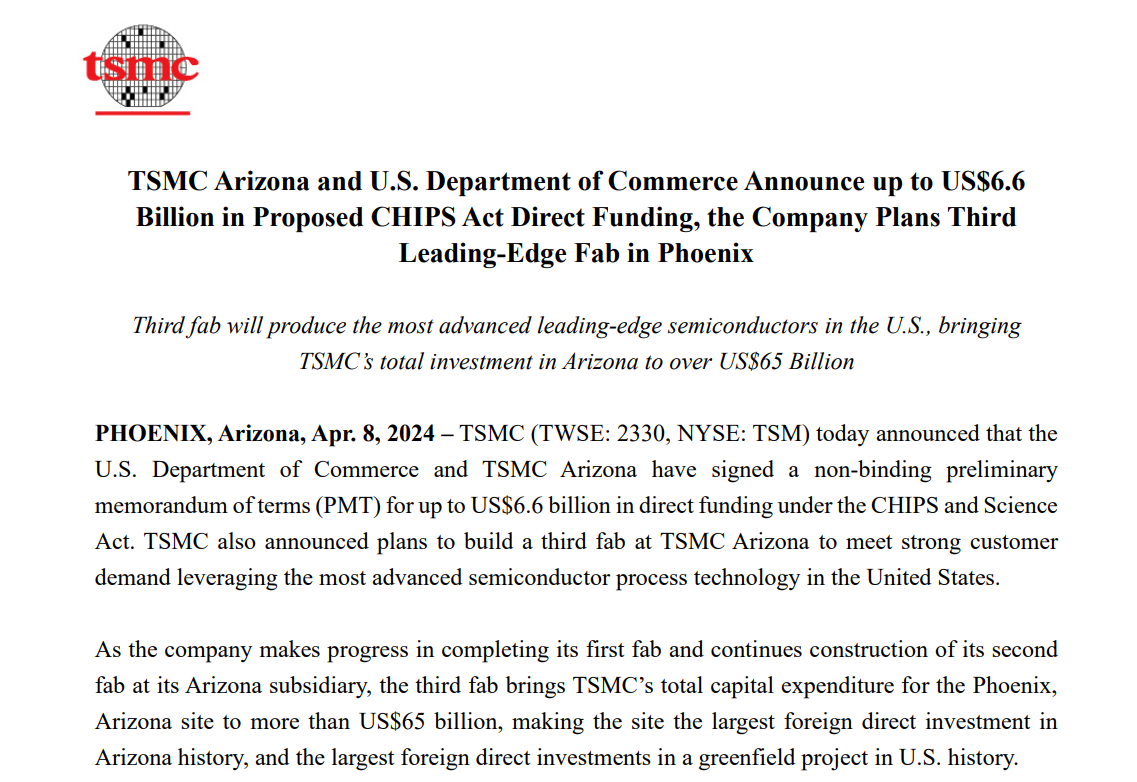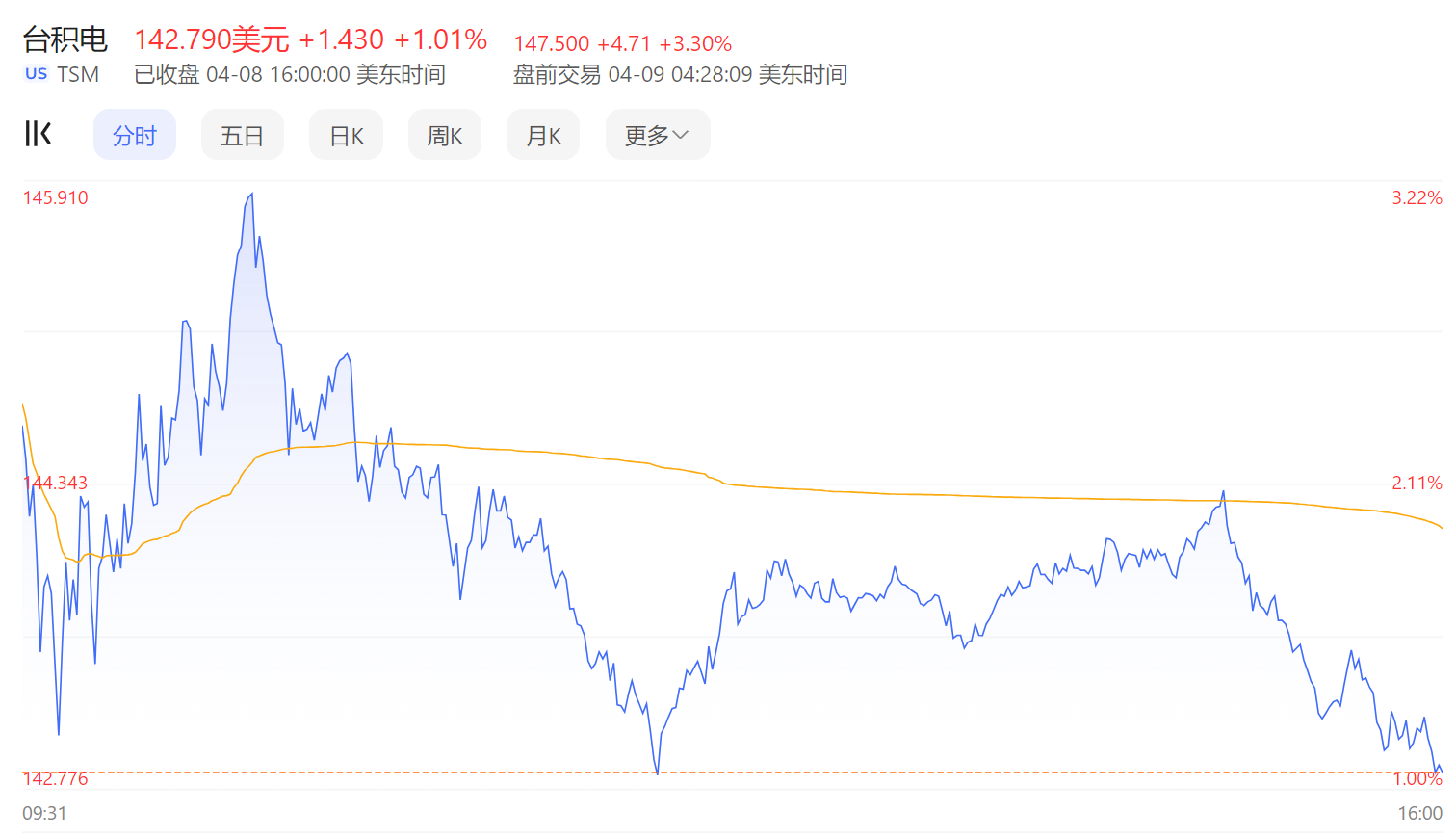Following Intel, TSMC will receive $11.6 billion from the US government
TSMC announced that the US Department of Commerce will provide $6.6 billion in direct funding to the company under the Chip and Science Act to build a semiconductor factory in Phoenix, Arizona, and will also provide up to $5 bn in loans.
On April 8th, TSMC announced that the US Department of Commerce will provide $6.6 billion in direct funding to the company under the Chip and Science Act to build a semiconductor factory in Phoenix, Arizona, and will also provide up to $5 billion in loans. That is to say, TSMC suddenly received a US government subsidy of 11.6 billion US dollars.

The above funding will be targeted at TSMC's subsidiary in Arizona, USA. Currently, TSMC plans to build three semiconductor factories in Arizona. TSMC stated that the three semiconductor factories have resulted in a total investment of over $65 billion for the company's Phoenix factory in Arizona. TSMC stated in a statement that this investment is the largest direct investment by a foreign entity in US environmental projects in history.
In addition to the proposed $6.6 billion direct funding, the US Department of Commerce will provide up to $5 billion in loans to TSMC. TSMC stated that it plans to apply to the US Treasury for an investment tax credit of up to 25% of TSMC's qualified capital expenditure in Arizona.
TSMC also stated that the company is still committed to achieving its long-term financial goals, which are a compound annual growth rate of 15-20% for revenue, a gross profit margin of 53% or higher, and a return on equity of 25% or higher.
Dr. Liu Deyin, Chairman of TSMC, stated that the Chip and Science Act provides TSMC with unprecedented investment opportunities and contract manufacturing services for the most advanced manufacturing technologies in the United States.
Affected by the above news, TSMC's stock price opened high on Monday, with an early morning rise of over 3%. Subsequently, the increase declined and ultimately closed up about 1%.

It is reported that TSMC's first semiconductor factory in Arizona will begin production in the first half of 2025, using 4nm process technology. The second semiconductor factory will adopt 3nm and 2nm process technologies and is expected to start production in 2028. The third semiconductor factory will adopt 2nm process technology and is scheduled to start production by the end of this decade.
TSMC's three factories in Arizona are expected to create approximately 6,000 high-tech, high paying direct jobs. According to the analysis of the Greater Phoenix Economic Council, increasing investment in three semiconductor factories will create a total of over 20,000 construction jobs, as well as tens of thousands of indirect supplier and consumer jobs.
However, TSMC's construction of a factory in Arizona has not been smooth sailing. The construction of the first factory was delayed due to months of conflict with the union. The second factory was originally scheduled to start construction in 2026, but due to market conditions and uncertainty in US government subsidies, it has been postponed to 2028. It is reported that at least one TSMC supplier has abandoned the planned Arizona project due to labor shortages.
Despite the initial difficulties in the construction of the aforementioned factories, fortunately, the government subsidies have finally been received.
The US Department of Commerce said: "TSMC's three factories in Arizona will produce tens of millions of cutting-edge chips after full production, which will provide power for 5G/6G smart phones, autonomous vehicle, artificial intelligence data center servers and other products."
"Through its Arizona factory, TSMC will be able to better support its main customers, including American companies such as AMD, Apple, Nvidia, and Qualcomm, to meet their leading capacity demands, alleviate supply chain issues, and provide support to them." The US Department of Commerce also stated that thanks to investments from TSMC in Arizona and other states, the United States is expected to produce about 20% of the world's cutting-edge chips by 2030.
However, TSMC will need to wait at least a few more months to receive the promised funds, as the company will enter a due diligence period before reaching a final and binding agreement. Then, the funds will be paid based on construction and production benchmarks, and if TSMC fails to fulfill the agreement, the funds may be recovered.
The Chip and Science Act, signed and effective in 2022, states that the US government will invest approximately $280 billion to promote domestic chip research and production, of which approximately $52 billion will be used to subsidize domestic chip manufacturing.
Prior to TSMC, Intel had already signed a preliminary agreement with the US Department of Commerce for nearly $20 billion in grants and loans. Samsung Electronics in South Korea is also expected to receive over $6 billion in grants from the US government for the construction of its semiconductor factory in Texas. In addition, there are reports that the US Department of Commerce is expected to announce billions of dollars in subsidies to Micron Technology in the coming weeks.
·Original
Disclaimer: The views in this article are from the original Creator and do not represent the views or position of Hawk Insight. The content of the article is for reference, communication and learning only, and does not constitute investment advice. If it involves copyright issues, please contact us for deletion.